|
|
|
Sort Order |
|
|
|
Items / Page
|
|
|
|
|
|
|
| Srl | Item |
| 1 |
ID:
121439
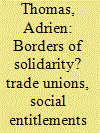

|
|
|
|
|
| Publication |
2013.
|
| Summary/Abstract |
This article explores the effects of borders on the making of trade union policies and on their capacity to act. It takes as an entry-point the reform of Luxembourg's system of family allowances and financial support for students in 2010, which redefined the group of beneficiaries and partly excluded cross-border workers from neighbouring countries. This led to heated debates in Luxembourg and in the Greater Region (comprising Luxembourg, Saarland, Rhineland-Palatinate, Lorraine and Wallonia) during which trade unions played an important part. The author explores the contradictory logics of both competition and cooperation within the Greater Region. These lead to a gap between integration as a discourse and what it means for local populations, in particular regarding labour market competition. The debates within trade unions on the issue of social entitlements for cross-border workers offer insights into the dynamics of this dichotomy and into the everyday fabric of cross-border social relations.
|
|
|
|
|
|
|
|
|
|
|
|
|
|
|
|
| 2 |
ID:
082346
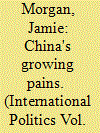

|
|
|
|
|
| Publication |
2008.
|
| Summary/Abstract |
China began what is commonly referred to as the reform (gaige) and opening (kaifeng) period at the end of the 1970s on the basis of a strategy that was incremental, experimental and localized. The basic approach was captured by the aphorism, bu pa man, jiu pa zhan - don't worry about going forward slowly, as long as you are going forward. Possible policies were tried out in specific regions and provinces, adjusted on the basis of the experience, discarded if problematic and gradually applied nationally if seen as viable. The effect of this approach was that China's reform process into the 1990s had been predominantly open-ended. By avoiding a close conformity to either a command economy model or the dominant capitalist models of developmental economics of the time, China confounded expectations of its economic growth potential. According to its own statistics, China has maintained growth levels in excess of 7% and usually greater than 10% for more than 20 years. In this sense, an open-ended approach has been a strength that has allowed for a degree of pragmatism that has contributed to sustained large-scale economic growth. However, the form of that open-endedness must also be considered a source of vulnerability
|
|
|
|
|
|
|
|
|
|
|
|
|
|
|
|
| 3 |
ID:
176383
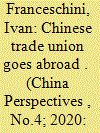

|
|
|
| 4 |
ID:
060738
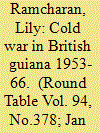

|
|
|
| 5 |
ID:
170981
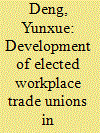

|
|
|
|
|
| Summary/Abstract |
In an investigation of the development of elected workplace trade unions in the Guangzhou auto parts industry from 2011 to 2015, this article explores autoworkers' capacity to build associational power in authoritarian China. It finds that an unprecedented wave of strikes in 2010 pushed the regional trade union in Guangzhou into promoting workplace trade union reform, which opened a limited but important opportunity for autoworkers to participate in trade union affairs. Since then, autoworkers have learned to utilize the elected workplace trade unions' resources to forge collective demands and actions. The author argues that autoworkers in Guangzhou are building their associational power by penetrating and exercising partial control over the state-run trade union at the grassroots level. Compared to independent trade unionism in other newly industrialized countries, these autoworkers' unionization efforts are small scale, are less militant, and can be easily suppressed by a powerful local state and global capital. Despite this, they demonstrate the growing trade union consciousness and unionization efforts among autoworkers in South China
|
|
|
|
|
|
|
|
|
|
|
|
|
|
|
|
| 6 |
ID:
148276
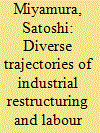

|
|
|
|
|
| Summary/Abstract |
It is often claimed that industrial restructuring leads to diminished roles for trade unionism and other forms of labour organisations by informalising employment and relocating production. Drawing on selected case studies from long-term fieldwork in regions of India, this article shows that trajectories of industrial restructuring and the responses by organised labour over the past two decades have been diverse. It is argued that the diverse response not only reflects structural opportunities and constraints for labour to be organised in particular ways, but also different histories and experiences of labour association. Contrary to the presumption about the general demise of trade unionism and the apparent unattainability of class solidarity in contemporary globalised capitalism, it is observed that India’s labour movement is experiencing a degree of resurgence, and new forms of labour organisations and activism are emerging, especially involving informal workers in the formal sector. That these innovative forms of mobilisation are shaped by experiences and aspirations that do not conform to the established institutionalised frameworks for dispute resolution has important policy and political implications.
|
|
|
|
|
|
|
|
|
|
|
|
|
|
|
|
| 7 |
ID:
118958
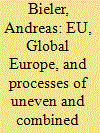

|
|
|
|
|
| Publication |
2013.
|
| Summary/Abstract |
In 2006, the European Union launched its new free trade strategy Global Europe with the explicit goal of increasing European competitiveness. This article explores the positions of trade unions and other social movements on Global Europe. Importantly, while Northern social movements and trade unions from the Global South reject Global Europe due to its impact of deindustrialisation on developing countries, European trade unions support it in so far as it opens up new markets for the export of European manufactured goods. It will be argued that this has to be understood against the background of the dynamics underlying the global economy and here in particular uneven and combined development. Due to the uneven integration of different parts of the world into the global economy, workers in developed countries may actually benefit from free trade, while workers in the Global South are more likely to lose out. It will, however, also be argued that while these different positions within the social relations of production are shaping the position of trade unions, they do not determine them. Over time, through direct engagement, trade unions in the North and South may be able to establish relations of transnational solidarity.
|
|
|
|
|
|
|
|
|
|
|
|
|
|
|
|
| 8 |
ID:
024439
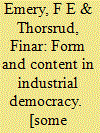

|
|
|
|
|
| Publication |
London, Tavistock, 1969.
|
| Description |
xi, 116p.
|
|
|
|
|
|
|
|
|
|
|
|
Copies: C:1/I:0,R:0,Q:0
Circulation
| Accession# | Call# | Current Location | Status | Policy | Location |
| 004033 | 331.8/EME 004033 | Main | On Shelf | General | |
|
|
|
|
| 9 |
ID:
082686
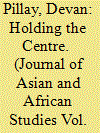

|
|
|
|
|
| Publication |
2008.
|
| Summary/Abstract |
The 2006 South African local election results confirm the approximately two-thirds support the African National Congress (ANC)-led Alliance - with the Congress of SA Trade Unions (COSATU) and the SA Communist Party (SACP) - received from those who voted in previous elections, a level of support that is also consistently reflected among COSATU members in surveys held during 1994, 1998 and 2004.1 However, the low voter turnout means less than a quarter of all eligible voters voted for the ANC. As tensions between the ANC leadership under Thabo Mbeki and its working class allies mounted, this should ordinarily have presented an opportunity to build a Left alternative among a disgruntled working class majority - except that the basis for such an alternative, organized workers, seem resistant to an independent `working class politics'. Instead, they put all their energies into replacing the Mbeki leadership with that of his deputy, Jacob Zuma. By remaining within the Alliance, are the increasingly outspoken COSATU and SACP leadership being constrained by a relatively conservative union membership, arguably one of the beneficiaries of the democratic transition; or are workers merely responding to signals from a (largely compromised) leadership that `working class hegemony' can only be realized through a `popular-democratic' politics within the Alliance
|
|
|
|
|
|
|
|
|
|
|
|
|
|
|
|
| 10 |
ID:
079916
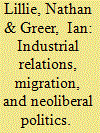

|
|
|
|
|
| Publication |
2007.
|
| Summary/Abstract |
Transnational politics and labor markets are undermining national industrial relations systems in Europe. This article examines the construction industry, where the internationalization of the labor market has gone especially far. To test hypotheses about di ferences between "national systems," the authors examine the United Kingdom, Finland, and Germany, alongside European-level policy making. Regardless of overall national institutional framework, employers seek to avoid industrial relations rules, while unions attempt to relocalize labor relations. Both use shop-floor, national, and European power resources. The authors argue that comparative industrial relations should take seriously the connection between action at the national and transnational levels.
|
|
|
|
|
|
|
|
|
|
|
|
|
|
|
|
| 11 |
ID:
158082
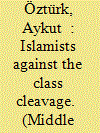

|
|
|
|
|
| Summary/Abstract |
One of the central characteristics of current Middle Eastern politics is the weakness of class-based political organizations. While structural explanations of this pattern abound, hegemonic struggles of Islamists to erode the class cleavage have so far been largely overlooked. In order to bring this perspective into the literature, this article studies discourses, affects and policies promoted by the Islamic trade unions confederation of Turkey, Hak-İş. After the introduction, I first demonstrate that the identity of Hak-İş has consistently been based on a fantasy of social cohesion and aversion to class-based politics. Building on this, I detail how Hak-İş has developed new economic and political practices, in a deliberate effort to overcome class-based unionism. Finally, I argue that the role of Hak-İş has evolved into representing workers' interests within the framework of the corporatist regime built by pro-Islamic AKP government.
|
|
|
|
|
|
|
|
|
|
|
|
|
|
|
|
| 12 |
ID:
121110
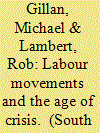

|
|
|
|
|
| Publication |
2013.
|
| Summary/Abstract |
Labour movements, in responding to global crises, are themselves confronted by 'intersecting contradictions' related to differing trade union forms and repertoires of action. In India, unions have been shaped in powerful ways by their historic articulation to state and politics. The scope and framing of union action has been somewhat limited. However, trade unions in India are also in a process of transition and are now more various in their forms, strategies and spatial relations.
|
|
|
|
|
|
|
|
|
|
|
|
|
|
|
|
| 13 |
ID:
084165
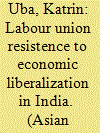

|
|
|
| 14 |
ID:
146058
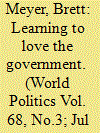

|
|
|
|
|
| Summary/Abstract |
One counterintuitive variation in wage-setting regulation is that countries with the highest labor standards and strongest labor movements are among the least likely to set a statutory minimum wage. This, the author argues, is due largely to trade union opposition. Trade unions oppose the minimum wage when they face minimal low-wage competition, which is affected by the political institutions regulating industrial action, collective agreements, and employment, as well as by the skill and wage levels of their members. When political institutions effectively regulate low-wage competition, unions oppose the minimum wage. When political institutions are less favorable toward unions, there may be a cleavage between high- and low-wage unions in their minimum wage preferences. The argument is illustrated with case studies of the UK, Germany, and Sweden. The author demonstrates how the regulation of low-wage competition affects unions’ minimum wage preferences by exploiting the following labor market institutional shocks: the Conservatives’ labor law reforms in the UK, the Hartz labor market reforms in Germany, and the European Court of Justice's Laval ruling in Sweden. The importance of union preferences for minimum wage adoption is also shown by how trade union confederation preferences influenced the position of the Labour Party in the UK and the Social Democratic Party in Germany.
|
|
|
|
|
|
|
|
|
|
|
|
|
|
|
|
| 15 |
ID:
119693
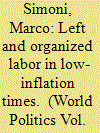

|
|
|
|
|
| Publication |
2013.
|
| Summary/Abstract |
This article presents fresh empirical data showing that policy alignment between center-left governments and trade unions was a sustained feature of European politics between 1974 and 2005. This contradicts expectations of a wide delinkage between the electoral left and labor as a consequence of globalization, deindustrialization, and unionization decline. However, structural economic change has altered the policy field so that sustained policy alignment can no longer be explained by existing theoretical frameworks.
Based on a theoretical argument and a multivariate empirical test, the article contends that policy alignment is likelier to occur if labor plays an important role in economic management at the microlevel and the industry level and if unions are politically cohesive agents thanks to powerful confederation leadership supported by democratic decision-making practices. In making its case, the article bridges the literatures on comparative capitalism and party politics, in order to account for change and continuity in policy-making processes
|
|
|
|
|
|
|
|
|
|
|
|
|
|
|
|
| 16 |
ID:
171940
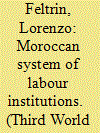

|
|
|
|
|
| Summary/Abstract |
The relevance of workers’ mobilisations in the 2011 Arab uprisings and – more recently – in the Algerian movement for democracy and social justice has encouraged a renewed interest in labour–state relations in the region. This article presents a class-based perspective on labour institutions, taking Morocco as a case study. In contrast to institution-based approaches, this research argues that it is problematic to treat the trade unions as analytical proxies for the working class, because this heuristic move conceals how class struggles – from below and from above – can transcend and transform labour institutions. The article proposes a framework to study labour–state relations, highlighting the relative autonomy of union officials from workers and vice versa. In this way, it shows how, in the neoliberal phase, the Moroccan state increased inducements to the unions while decreasing those to the workers and maintaining significant constraints on workplace organising. To use a simplified formulation, the regime included the unions to exclude the workers. In such a context of low union representativeness, the dangers of reducing the working class to the trade unions emerge clearly.
|
|
|
|
|
|
|
|
|
|
|
|
|
|
|
|
| 17 |
ID:
144738
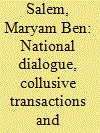

|
|
|
|
|
| Summary/Abstract |
The Tunisian political crisis that started in July 2013 was resolved thanks to the National Dialogue hosted by the Quartet who were recently awarded the Nobel Peace Prize. The ND was a collusive transaction that allowed Ennahdha to escape accountability for its political responsibility. Nevertheless, by resolving the crisis, it generated legitimacy. It also contributed significantly to the current configuration of alliances within the power circle by making possible the alliance between Ennahdha and Nidaa Tounes after the 2014 elections. The mechanisms of mutual recognition between Ennahda and Nidaa Tounes help ensure political stability by reinforcing the government’s position. However, this alliance appears to be a source of delegitimation now that the government is facing many challenges (economic crisis, security crisis and disputed political decisions). The critical situation, particularly at the security level, challenges the idea of compromise and undermines the government’s ability to make the people believe in its legitimacy.
|
|
|
|
|
|
|
|
|
|
|
|
|
|
|
|
| 18 |
ID:
158261
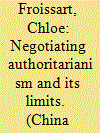

|
|
|
|
|
| Summary/Abstract |
Contrary to some scholars’ assertions, worker-led collective bargaining has become a practical reality in China, especially as seen in Guangdong Province between 2011 and 2015. This article analyses the practices and strategies of negotiation to show how this is possible in a regime that recognizes neither independent trade unions nor the right to strike. Labour NGOs have become a catalyst for collective action that enables workers to change the power balance with employers, official unions and local authorities and alter their response to labour conflicts. This article thus challenges the concept of ‘bargained authoritarianism’ by stressing social actors’ ability to carve out a space for negotiating authoritarianism despite obvious limits and tightening political constraints. However, collective bargaining will remain ad hoc and localized as long as trade unions and local authorities refuse to strike a durable alliance with workers and labour NGOs.
|
|
|
|
|
|
|
|
|
|
|
|
|
|
|
|
| 19 |
ID:
117051
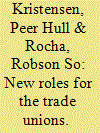

|
|
|
|
|
| Publication |
2012.
|
| Summary/Abstract |
This article builds on lessons from Denmark and the Nordic area to offer a novel and comprehensive logic of action within the emerging political economy that may be used to assess the possible new roles that unions can take on. The authors argue that unions are capable of "civilizing" globalization and current forms of governance by becoming responsible for pushing for a governance regime in a new and more egalitarian direction.
|
|
|
|
|
|
|
|
|
|
|
|
|
|
|
|
| 20 |
ID:
091770
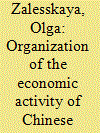

|
|
|
|
|
| Publication |
2009.
|
| Summary/Abstract |
In the 1920-1930s, the economic activity of Chinese migrants living in the Far East of Russia was essentially reorganized. Chinese workers were drawn in trade unions and cooperatives. This article describes the specific features of the trade union and cooperative movement among Chinese migrants and analyzes the role of cooperatives and trade unions in the integration of Chinese migrants in the socio-economic life of the Soviet Far East.
|
|
|
|
|
|
|
|
|
|
|
|
|
|
|
|
|
|
|
|
|